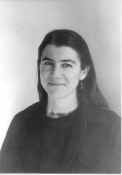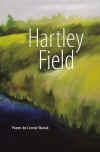Who Really Wants to Be Kinged?: Connie Wanek
Jean Sramek here contributes the first Featured Artist article, on poet Connie Wanek of Duluth. Every month we will feature an artist from mnartists.org. We hope you will enjoy coming to know some of the rich variety represented on the site.


Connie Wanek didn’t start calling herself a writer until after the publication of her second collection of poems, Hartley Field (2002, Holy Cow! Press, Duluth, Minn.). While she has always been a writer, and has been making poems most of her adult life, Wanek was never quite comfortable using the term “poet” to describe what she did.
“People have funny ideas about what poetry is,” Wanek says, “and they have even funnier ideas about what a poet is. Or looks like. Or why someone would, for instance, hire a poet.” Wanek’s words are self-deprecating, but confident and practical. Her manner is at once serene and fidgety, and as we sit at her dining room table, her husband Phil Dentinger and daughter Hannah wander in and out of the room, preparing for a Boundary Waters canoe trip, tossing in wisecracks about how hard it is for Connie to sit still long enough to be interviewed.
There’s humor behind everything she says, and she lights up when she’s choosing language to answer questions or tell her own history. As she speaks, you can almost hear her lining up her words like Scrabble tiles, taking pleasure in clicking them into an order that pleases her. It sounds like what a poet would do.
Wanek, 51, was born near Green Bay, Wisconsin; her family moved to Las Cruces, New Mexico, when she was a child. Wanek originally intended to study visual art at her hometown college, New Mexico State University, but it was the early 1970’s, abstract expressionism was the going thing, and Wanek’s art professors were lukewarm about Wanek’s almost photorealist style. She herself felt she lacked the visual imagination necessary to excel. “I could copy things, but I couldn’t generate anything new—I couldn’t imagine what to make,” she explains. At that point, “desperate English professors” recruited her as an English major. “I have always taken the path of least resistance,” she remarks dryly. “As a rule, I think girls tend to do what they get praised for. I got more praise in English than in art.” She found her strength as an artist lay in her verbal—rather than visual—imagination, in reacting to things in terms of metaphor. She fell in love with figurative language and with making poetry. Today, Wanek prides herself on the adventurousness of her imagery, her ability to use metaphors that are both familiar and apt.
In college, she played competitive tennis, majored in English, and met and married Phil, a fellow writer who is “my best reader, and my most honest critic; I am lucky to have him built into my life.” Together, they started a small business—selling and installing solar-heated swimming pools—and learned to restore old houses, work which they found very satisfying. Phil grew up in Duluth, and 13 years ago, Connie, Phil, and their two children (Hannah, now 24; and Casey, now 19) moved back to Duluth. There is no shortage of old houses in need of restoration here, so the family has been able to continue the work they enjoy, and Connie also has a part-time job as a public library technician—which she likes.
Writing has been a constant for Wanek, no matter what her other roles or vocations. Writing, in a more specific way than a job or a place in a family, represents who she is. The move back to the Great Lakes area has recalled Wanek’s childhood years, inspiring her in two ways: “I’m looking at this place as a 7-year-old, and also as a 51-year-old.” The title poem from her second book was named for a large nature area near her home, rich in history and well-loved as one of the city’s “old places”—Hartley Field. Like so many other residents of the area, Wanek finds the roughness and wildness inspiring. “Here, human beings are put in their places by nature on a daily basis. You are a small part of the natural order. It demands humility.”
Her poems “Broom” and “Abstract,” which were later included in her first collection, Bonfire (1997, New Rivers Press, Minneapolis) were reviewed in the prestigious periodical Poetry in 1991. Winning the New Rivers’ “New Voices” competition resulted in Bonfire’s publication. Her second book, Hartley Field, has received much praise, including a review in Poetry in June 2003. By all accounts, she is a poet who certainly deserves the name. Her pre-Hartley Field reluctance to call herself “poet” doesn’t stem from insecurity or modesty. It is an extension of her way of seeing and of being, her approach to her art, and of the place in life she has made for herself as an artist. She is not focused on the product—the poem—but on the process of getting to it, something that you might describe as “life” rather than “writing poems.”
For Wanek, the “very golden moment” is not being published, or having a responsive audience, getting praise for a specific poem, or finishing a manuscript. Those moments, while gratifying and a source of pride, are removed from the actual act of creation. Compared to generating new work, being published, she says, is akin to bookkeeping. What counts for her is “that moment, that heady feeling you get when you think you’ve done something good—even if it later turns out not to be good. That’s what keeps me writing.” She jokes that she’s a lab rat in a psychology experiment: given irregular schedules of reinforcement, certain behaviors will persist for years and years. “I write every day. 19 out of 20 days, I strike out. But that one day is so good. ”
That pure joy—not the realization that she has made something good, but that the making of something is good—is what she craves. It’s not surprising that she doesn’t have a specific literary goal, a “What’s next for poet Connie Wanek?” in her sights. When asked what is next for poet Connie Wanek, she explains that she “lacks the planning gene,” says happily that she does not understand goals, reaches for Hartley Field, and reads aloud “Checkers.” The poem’s narrator, just as content to lose at a game of checkers as to win (as long as there is food and sleep afterwards) has game pieces “… bearing the smiles of the successfully defeated … Who really wanted to be kinged? To stagger under a crown heavy as a headstone, to wander the board without a court or even the escort of a fool? What was glory?” For Wanek, losing is as good as winning, as long as she is playing, noticing, paying attention, receiving the world.
Checkers
Red was passion, black was strength.
Yet one checker always had gone missing.
a deserter discovered eventually
cowering under a chair cushion.
What was there to fear?
Only time itself would be killed.
I was one who never planned ahead,
who sent my infantry into any open field.
Under my command they aspired
merely to be captured,
jumped and hauled off, bearing the smiles
of the successfully defeated.
Who really wanted to be kinged?
To stagger under a crown
heavy as a headstone,
to wander the board without a court
or even the escort of a fool?
What was glory? I never understood the word.
Often some idle soul of a certain age
taught checkers to the young,
offering stratagems
continually overruled by blind luck.
Then came snacks and naps
and afterwards, the balance of the day.
Hartley Field
The wind cooled as it crossed the open pond
and drove little waves towards us,
brisk, purposeful waves
that vanished at our feet—such energy
thwarted by so little elevation.
The wind was endless, seamless,
old as the earth.
to regard us with favor. I felt them alight,
felt their minute footfalls.
I was a challenge, an Everest …
And you, whom I have heard breathe all night,
sigh through the water of sleep
with vestigal gills …
A pair of dragonflies drifted past us, silent,
while higher up two bullet-shaped jets
dragged their roars behind them
on unbreakable chains. It seemed a pity
we’d given up the sky to them, but I understand so little.
Perhaps it was necessary.
All our years together—
and not just together. Surely by now
we have the same blood type, the same myopia.
Sometimes I think we’re the same sex,
the one in the middle of man and woman,
born of both as every child is.
The waves came to us, one each heartbeat,
and lay themselves at our feet.
The swelling goes down.
The fever cools.
There, where the Hartleys grew lettuce eighty years ago
bear and beaver, fox and partridge
den and nest and hunt
and are hunted. I wish I had the means
to give all the north back to itself, to let the pines
rise in the hayfield and the lilacs go wild.
But then where would we live?
I wanted that hour with you all winter—
I thought of it while I worked,
before I slept and when I woke,
a time when the tangled would straighten,
when contrition would become benediction:
the positive hour, shining like mica.
At last the wind brought it to us across the pond,
then took it up again, every last minute.
Connie Wanek has a full schedule of readings and apprearances coming up. She’s doing a reading at
Banfill-Locke on Aug. 8, at 7:30pm, with Joyce Sutphen; she’ll participate in two readings for the DNR–on August
9 in St. Paul at the Mississippi River Visitors’ Center
grand opening at 3pm, and again at the State Fair,
Mississippi River stage near the DNR booth, at 4pm on September 21. She’ll be at Concordia College in Moorhead as a visiting
writer for the Writers’ Festival, September 24-26, and
will also be a visiting writer at Mankato State for the Good
Thunder Reading Series, in early October.